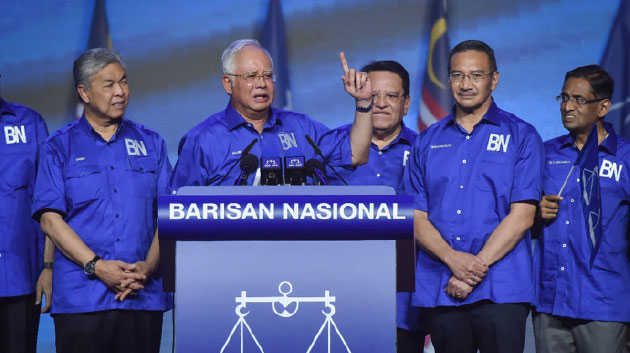Malaysia Elections: Showdown Between Former PM Mahathir and PM Najib
Caption: 8 April, Malaysian PM Najib announces his manifesto ahead of elections. Hafiz Johari / Shutterstock.com
Key points in this article:
- Malaysia is due to hold elections on 9 May. Will we witness the first administration change in 60 years?
- A fierce battle between PM Najib’s Barisan Nasional Coalition and Mahathir’s Pakatan Harapan opposition coalition
- Najib leans towards China; Mahathir warns of China’s threat
On 10 April, Malaysia’s electoral commission officially announced that the national elections would be held on 9 May. For the past 60 years, Barisan Nasional coalition, of which PM Najib is the current leader, has governed the country. Mahathir’s Pakatan Harapan (Alliance of Hope) opposition coalition is now proving itself a powerful contender.
Najib, however, is in the middle of an unresolved scandal. He is thought to have embezzled RM 2.67 billion (USD700 million) worth of funds from 1Malaysia Development Berhad (1MDB), a government-owned strategic development company. Criticism is strong against the Najib government, and hopes are rising toward Mahathir’s Pakatan Harapan – the anti-Najib party.
PM Najib’s Mindless Self-Protective Government
Realizing that he is standing on thin ice, Najib has started a mindless self-protection campaign. First he demanded the suspension of Mahathir’s Malaysian United Indigenous Party for inadequacy in registration documentation for the elections. On hearing this, Mahathir said at a news conference, “Whatever happens to us, we are going to contest”.
Najib then went on to announce the Anti-Fake News Act 2018, and has started to control media reports that are disadvantageous to his government.
“Malaysia’s ‘fake news’ bill is a blatant attempt by the government to prevent any and all news that it doesn’t like, whether about corruption or elections,” said Brad Adams of Human Rights Watch.
Najib has adopted brazen policies to secure victory in the elections, such as providing funding for pensioners and raising the minimum wage for civil servants. Polls in March, however, revealed that Mahathir had a popularity vote of 61% against Najib’s 39%.
Pro-China Najib
Mahathir is 92 years old, and if he wins he will become the oldest Prime Minister in the world. He was the longest-serving prime minister, and after being in office previously for 22 years, he resigned voluntarily and was living a comfortable retirement.
Why then, has he come back to face Najib in his old age?
The reason is probably because Mahathir realizes the problems inherent in Najib’s close relations with China.
The Najib government is supportive of Xi Jinping’s “One Belt One Road” initiative to create a new China-led economic silk road. Najib desperately wants to return the huge debts collecting in the 1MDB, and China could possibly provide Malaysia with economic aid.
Currently Malaysia is undertaking over 40 “One Belt One Road”-related projects in infrastructure investments such as railroads, electricity, factories, property and seaports. And this has started to expand into IT, manufacturing, education, agriculture, forestry, fisheries, and tourism.
China is up against the Malacca Dilemma: that 80% of their crude oil imports pass through the Strait of Malacca, which is now under U.S. protection. China is trying to establish a cooperative relationship with Malaysia to secure the route via the Strait of Malacca as a backup plan for if ever their shipment routes in the South China Sea are threatened.
Former PM Mahathir A Threat to China
On the other hand, Mahathir is dismissive of Najib’s cooperation with the One Belt One Road plan. “We are for Malaysians. We want to defend the rights of Malaysians. We don’t want to sell chunks of this country to foreign companies who will develop whole towns,” he said.
Mahathir himself is not exactly a clean politician, but his ideas about China are on the mark. If his opposition coalition wins the election, it may save Malaysia from influences of the One Belt One Road ideology.
In 1981 Mahathir initiated the “Look East” policy. By “East” he was referring to Japan. It was a movement that looked to how Japan rose like a phoenix from the ashes of post-WWII through diligence and self-reliance.
Japan still remains the greatest supporter of South East Asia and its greatest investor. Japan can also help restrain China by honing their skills in diplomacy.



















